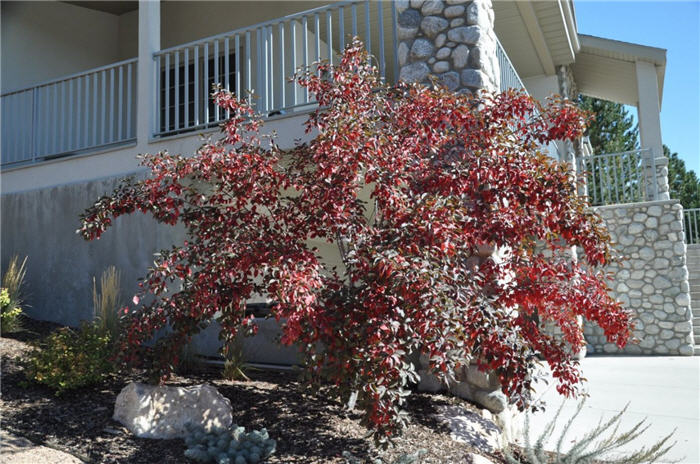| Botanical Name: Prunus x cistena | |
| Common Name: Purpleleaf Sandcherry |

-
Anatomy
-
Culture
-
Design
Plant Type
Shrub
Height Range
3-6'
Flower Color
Pink, White
Flower Season
Spring
Leaf Color
Bronze, Green, Dark Green, Red
Bark Color
Brown, Red
Fruit Color
Black, Red
Fruit Season
Summer, Fall
Sun
Full, Half
Water
Low, Medium
Growth Rate
Moderate
Soil Type
Sandy, Clay, Loam
Soil Condition
Average, Rich, Poor, Well-drained, Dry
Soil pH
Neutral, Basic
Adverse Factors
n/a
Design Styles
English Cottage, Formal, Japanese, Ranch
Accenting Features
Fall Color, Showy Flowers
Seasonal Interest
Winter, Spring, Summer, Fall
Location Uses
Background, Perennial Border, Shrub Border, Foundation, Patio, Raised Planter, Walls / Fences, With Rocks
Special Uses
Cut Flowers, Hedge, Screen, Mass Planting, Small Spaces
Attracts Wildlife
Birds, Butterflies
Information by: Stephanie Duer
Photographer:
Photographer:
-
Description
-
Notes
Purpleleaf sandcherry is a deciduous shrub valued for its reddish-purple foliage, fragrant white and pink spring flowers, and purple-black fruit. It grows about 7 to 10 feet tall and 5 to 8 feet wide, with an upright, vase shape. It is sometimes sold as a single-stem tree, but will require maintenance to maintain this form. Bark is a dark brown to red, and is a nice contrast in the winter garden. Branches are nice in vases.
Tolerates many soils, as long as it is well drained, and full sun to light shade to maintain foliage color; in too much shade the leaves become a muddy green. Hardy to USDA Zone 3. Pruning usually isn't necessary, unless you are trying to maintain a tree-like form. If you need to prune the shrub, it is best to either prune selectively or to renovate (see Guides). Hardy to -30F